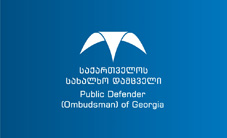
Lomjaria: Prosecutor's Office refuses to start investigation on interference in Ombudsman's work
By Nika Gamtsemlidze
Friday, February 7
The Prosecutor's Office refused to launch an investigation into the government's involvement in the Ombudsman's activities.
Public Defender Nino Lomjaria provided the information to the journalists, according to which, the Office of the Ombudsman received an official letter from the Prosecutor's Office stating that the Office did not find any signs of guilt in the fact that the Penitentiary Service had made the meeting with the prisoners public.
“There was an impact on the Public Defender. In any form, the influence of the Public Defender is prohibited by the Criminal Code, which was intended to interfere with the activities of the Public Defender. I think the signs of crime were there. The prosecution's letter was unjustified and I do not agree with the arguments. We will make this letter public to show what arguments the prosecution is making when it refuses to launch an investigation,” said the public defender.
On January 23, the Special Penitentiary Service issued a notice of the arrival of Nino Lomjaria at Prison No. 9 (Matrosov Prison). According to the service, Lomjaria met with former Prime Minister Vano Merabishvili and former Defense Minister Irakli Okruashvili.
After making the information about the meeting public, the Public Defender said that “there has been a direct violation of the Organic Law that prohibits any kind of surveillance of a Public Defender during a meeting with prisoners.” Nino Lomjaria called on the Prosecutor's Office to launch an investigation.
As Lomjaria noted after the information got public, apart from violating the fundamental principles, the Special Penitentiary Service/Ministry of Justice grossly violated the Organic Law of Georgia on the Public Defender, according to which, the Public Defender's meeting with detainees, prisoners or other persons deprived of their liberty shall be confidential. Any kind of surveillance (video or audio) is inadmissible.
According to the public defender, releasing the identities of persons met by the Public Defender increases the risk of ill-treatment of prisoners or other illegal actions and results in the deterioration of the prisoners’ rights situation. Making similar information public may make prisoners refrain from applying and meeting with the Public Defender in the future.
The report also noted that following this incident, all prisoners will have suspicions that their meetings with the Public Defender are controlled by the Ministry of Justice/Penitentiary Service and that the details of the meetings may be publicly disclosed.
According to the Constitution of Georgia, creating obstacles to the activities of the Public Defender is punishable by law. According to the Optional Protocol to the Convention against Torture and Other Cruel, Inhuman or Degrading Treatment or Punishment, the Public Defender serves as a national preventive mechanism in the country. Under Article 21 of the Protocol, personal data shall not be made public without the clear consent of the interested party.
The Public Defender of Georgia, an ombudsman, is an institution that oversees the observance of human rights and freedoms in Georgia. It advises the government on human rights issues.



